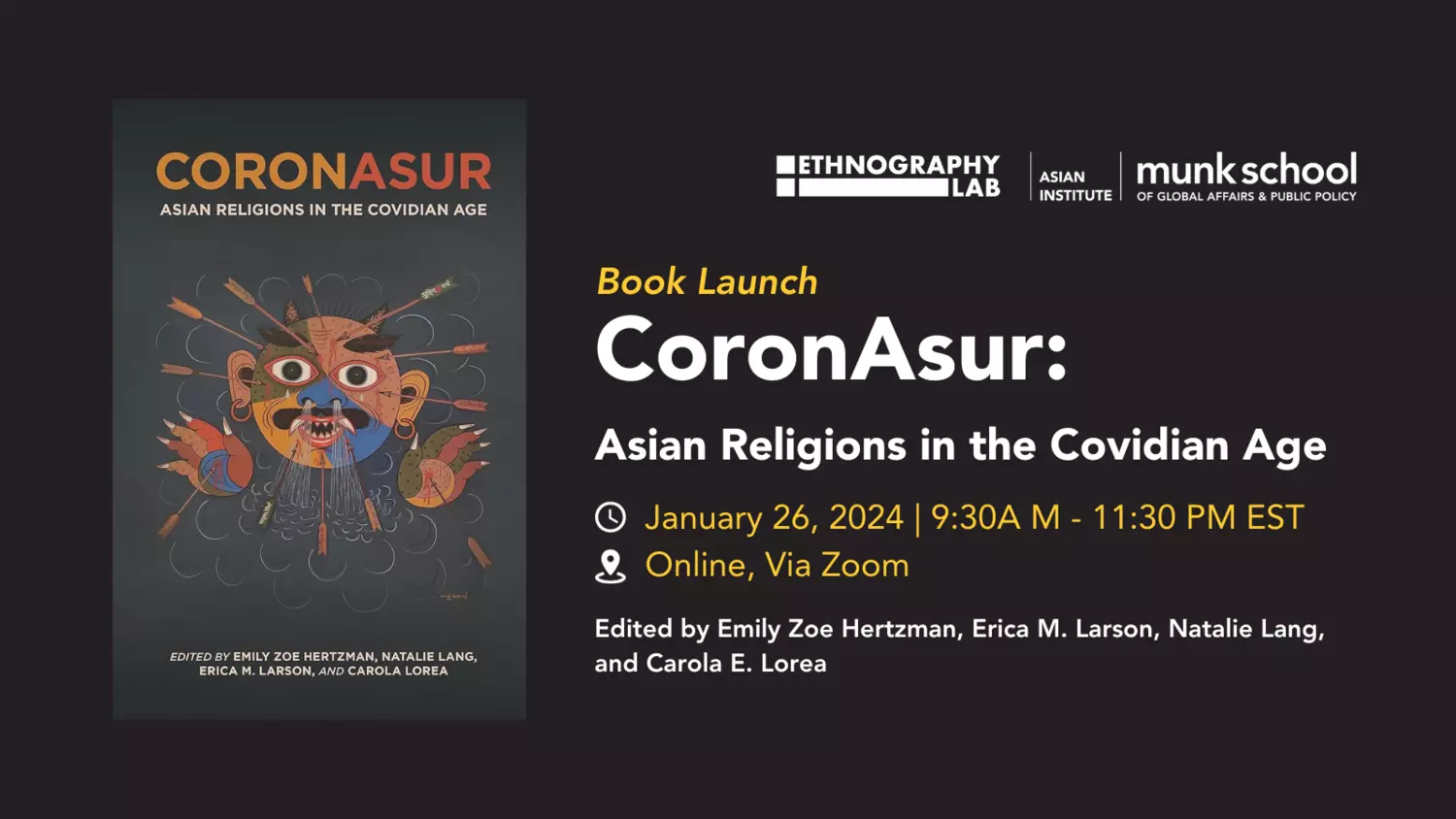
CoronAsur: Asian Religions in the Covidian Age
January 26, 2024 | 9:30AM - 11:30AM
|
Online
This was an online event
ABOUT THE BOOK
By the summer of 2020, when the coronavirus had fully entered our everyday vocabulary and our lives, religious communities and places of worship around the world were already undergoing profound changes. In Asian and Asian diaspora communities, diverse cultural tropes, beliefs, and artifacts were mobilized to make sense of Covid, including a repertoire of gods and demons like Coronasur, the virus depicted with the horns and fangs of a traditional Hindu demon. Various kinds of knowledge were invoked: theologies, indigenous medicines, and biomedical narratives, as well as ethical values and nationalist sentiments. CoronAsur: Asian Religions in the Covidian Age follows the documentation and analysis of the abrupt societal shifts triggered by the pandemic to understand current and future pandemic times, while revealing further avenues for research on religion that have opened up in the Covidian age.
Developed in tandem with the research blog CoronAsur: Religion and COVID-19, this volume is a “phygital” publication, a work grounded in empirical roots as well as digitally born communication. It comprises thirty-eight essays that examine Asian religious communities—Muslim, Buddhist, Hindu, Daoist, and Christian as well as popular/folk and new religious movements, or NRMs—in terms of the changes brought on by and the ritual responses to the Covid pandemic.
Studying religious narratives, practices, and changes in the Covidian age adds to our understanding of not only the specific groups in which they are situated, but also the coronavirus itself, its disputed etiologies and culturally contextualized exegeses. CoronAsur offers a comprehensive and timely discussion of Covidian transformations in religious communities’ engagements with media, spaces, and moral and political economies, documenting how religious practices and discourses have co-produced the meanings of the pandemic.
ABOUT THE EDITORS
Emily Zoe Hertzman is a sociocultural anthropologist whose research focuses on Chinese Indonesian mobilities and identities. She received a BA and MA from the University of British Columbia and a PhD from the University of Toronto (2017). She was the She joined the Asia Research Institute as a research fellow at the National University of Singapore in 2021.
Erica M. Larson is a research fellow at the Asia Research Institute, National University of Singapore. She holds a PhD in cultural anthropology from Boston University. Her research examines the intersection of education, religion, ethics, and politics in Indonesia, and her monograph, Ethics of Belonging: Education, Religion, and Politics in Manado, Indonesia, is forthcoming with the University of Hawai‘i Press.
Natalie Lang is a research fellow at the Centre for Modern Indian Studies, University of Göttingen. She was a postdoctoral fellow at the Asia Research Institute, National University of Singapore, and an associated junior fellow at the Max Weber Centre for Advanced Cultural and Social Studies, University of Erfurt. She is the author of Religion and Pride: Hindus in Search of Recognition in La Réunion (2021).
Carola E. Lorea is a scholar interested in oral traditions and popular religions in South Asia. She was a senior research fellow at the Asia Research Institute, National University of Singapore before starting a professorship of Rethinking Global Religion at the University of Tübingen. She received research fellowships from IIAS, Gonda Foundation (Leiden), and SAI (Heidelberg) to study traveling archives of songs in the borderlands of India and Bangladesh. Her monograph (Folklore, Religion and the Songs of a Bengali Madman, 2016) discusses the intersections of religion, displacement, and sacred sounds through the lens of performance.
(Event Chair) Pamela Klassen, FRSC, is a Professor, Chair, and Graduate Chair of the Department for the Study of Religion and cross-appointed to Anthropology. Klassen teaches graduate and undergraduate students in anthropology and the history of Christianity and colonialism in North America and Turtle Island, religion and public memory, and religion, law, media, and gender. She welcomes inquiries from prospective students in these and related areas. For 2022-23 she was the William Lyon Mackenzie King Visiting Professor of Canadian Studies at the Weatherhead Center for International Affairs, Harvard University, where she was hosted by the Department of English and the Committee on the Study of Religion.
(Discussant) Catherine Larouche is an Assistant Professor of Anthropology at Université Laval, Quebec. Working primarily in India, her research is at the intersection of the anthropology of religion, political anthropology and the anthropology of humanitarianism. Her current research, titled “Religion, aid and the COVID19 pandemic: How minority religious groups shape welfare in India” explores the role of civil society groups in welfare and emergency aid provision in India, along with their relations with the state. A forthcoming research project examines transnational care and support networks among South Asian communities. She co-edited a special issue on transnational giving in South Asia published in the journal Ethnography, and her work has also been published in journals including Journal of Refugee Studies, Qualitative Research and Anthropologie et Sociétés.
Sponsor: Asian Institute, Munk School of Global Affairs & Public Policy
Co-Sponsor: The Ethnography Lab, A University of Toronto Anthropology Initiative